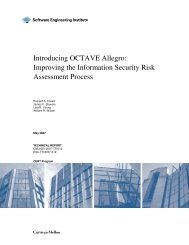State of the Practice of Computer Security Incident Response Teams ...
State of the Practice of Computer Security Incident Response Teams ...
State of the Practice of Computer Security Incident Response Teams ...
Create successful ePaper yourself
Turn your PDF publications into a flip-book with our unique Google optimized e-Paper software.
Nebraska Information Technology Commission<br />
Standards and Guidelines<br />
<strong>Security</strong> Architecture<br />
Keep a list <strong>of</strong> <strong>the</strong> incident response team members’ names, titles and 24/7contact information,<br />
along with <strong>the</strong>ir role in a security breach. Have contact information for vendors<br />
contracted to help during a security emergency, as well as ISPs and o<strong>the</strong>r relevant<br />
technology providers. Have contact information for major customers and clients who<br />
might be affected. In advance, establish contacts at <strong>the</strong> relevant law enforcement<br />
agencies: typically, <strong>the</strong> national infrastructure protection and computer intrusion squad<br />
at <strong>the</strong> local FBI field <strong>of</strong>fice; <strong>the</strong> electronic crimes investigator at <strong>the</strong> local Secret<br />
Service field <strong>of</strong>fice; and <strong>the</strong> electronic crimes investigator at <strong>the</strong> Nebraska <strong>State</strong> Patrol.<br />
Have <strong>the</strong>ir contact information easily accessible.<br />
Perform a risk analysis on your plan. Test and rehearse procedures periodically. Develop<br />
contingency Plans in case your response infrastructure is attacked.<br />
What to Report<br />
The ultimate goal <strong>of</strong> security incident response and centralized reporting is to protect data and<br />
prevent obstruction <strong>of</strong> government operations. It is important to distinguish between<br />
problems that stem from mistakes or miscommunications and true security incidents<br />
that involve ei<strong>the</strong>r malicious intent or intent to circumvent security measures. <strong>Security</strong><br />
incident reporting should be used only for true security incidents. You should report<br />
events that have a real impact on your organization (such as when damage is done,<br />
access is achieved by <strong>the</strong> intruder, loss occurs, web pages are defaced, malicious code<br />
is implanted) or when you detect something noteworthy or unusual (new traffic<br />
pattern, new type <strong>of</strong> malicious code, specific IP as source <strong>of</strong> persistent attacks). Do<br />
not report routine probes, port scans, or o<strong>the</strong>r common events.<br />
A security incident includes, but is not limited to <strong>the</strong> following events, regardless <strong>of</strong> platform<br />
or computer environment:<br />
1. Evidence <strong>of</strong> tampering with data;<br />
2. Denial <strong>of</strong> service attack on <strong>the</strong> agency;<br />
3. Web site defacement;<br />
4. Unauthorized access or repeated attempts at unauthorized access (from ei<strong>the</strong>r<br />
internal or external sources);<br />
5. Social engineering incidents;<br />
6. Virus attacks which adversely affect servers or multiple workstations;<br />
7. O<strong>the</strong>r incidents that could undermine confidence and trust in <strong>the</strong> state’s<br />
information technology systems.<br />
When and How to Report an <strong>Incident</strong><br />
If an attack is under way, you should call your previously established law enforcement contact<br />
immediately and communicate <strong>the</strong> basic information that is included in <strong>the</strong> <strong>Computer</strong><br />
<strong>Incident</strong> Reporting Short Form. There is additional information that will be required to<br />
effectively conduct <strong>the</strong> investigation (see bullet points below), but <strong>the</strong> form is a good<br />
place to start. Sometimes you will report an incident to law enforcement after <strong>the</strong><br />
fact—you have detected that something happened, but your systems are functioning<br />
normally and whatever damage is likely has already been done. In this case, you will
















